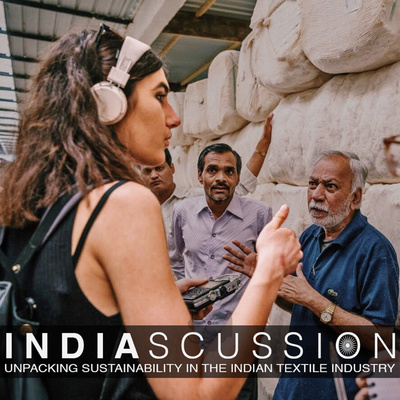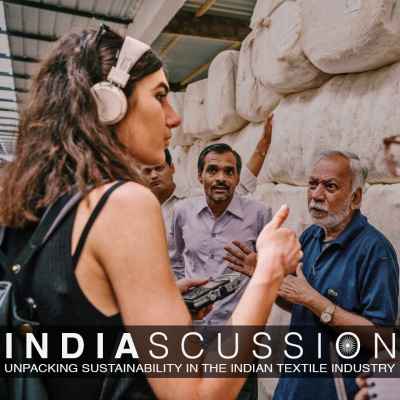
INDIAscussion
By INDIAscussion
INDIAscussion follows the textile supply chain through Gujarat and Maharashtra in India, across to China. Ideas and debates are presented ‘in discussion’ with local farmers and artisans, to businesses, fashion influencers, and international design houses.
Producer: Jelena Sofronijevic
Assistant Producer: Molly Lambourne
Presenters: Jelena Sofronijevic and Molly Lambourne

INDIAscussionFeb 27, 2020

BONUS EPISODE - Director Becky Hutner on Fashion Reimagined
Becky Hutner, director of Fashion Reimagined, talks about her new documentary following UK designer Amy Powney, on her mission to create a sustainable collection from field to finished garment.
Raised off-the-grid in rural Lancashire, in the north of England, fashion designer Amy Powney always felt uneasy about the environmental impact of her industry. When she won Vogue’s Best Young Designer of the Year Award, she used the £100,000 prize money to create a sustainable collection and transform her entire business, Mother of Pearl - now subject of a feature film-length documentary.
Director Becky Hutney shares her own sustainability journey, putting her individual awareness and skills to collective action, and meeting ‘heroes’ like Katherine Hamnett and Dana Thomas. We see how the team tackle traceability along the wool supply chain, taking them to producers in South America, and what laws on labelling and product passports could do for consumers’ understanding of clothing. Plus, Hutney shares Mother of Pearl’s slow, ‘seasonless’ approach fashion, business innovations in denim, and how we can have it both - degrowth, and a high street revival.
Fashion Reimagined is out in cinemas now, and available to stream on Sky Documentaries and NOW from 9 April 2023.
IMAGE: Dean Chapple.
SOUNDS: Fashion Reimagined.
PRODUCER: Jelena Sofronijevic.

China
China dominates the global textile market, responsible for over half of the world’s fabrics. If Kutch is the centre of Gujarati and Indian craft, Suzhou, in Jiangsu province, is China’s equivalent. Jelena travels to Suzhou to consider these questions of environmental, cultural, and economic sustainability in the Chinese textile industry.
Local tour guide Susan, and Zoe and Angel from the Suzhou Taihu Snow Silk Company, detail how Suzhou’s historic artisan crafts have transformed over time. International students in Soochow University seek to tackle unsustainable water use in the Chinese textile industry. Zoe Zhang, director of Hangzhou MONAD Fabrics, outlines the challenges faced by Chinese businesses in the international market.

Trade and Business
Textiles are the second most polluting industry worldwide. Yet, responsibility for sustainability is bandied about between consumers, businesses, not-for-profits, and governments. We pose challenging questions to these key interests across the textile value chain.
Pavithra, from the Indian start-up Infinitive, explains the need for a total systemic transition from the linear, fast fashion model towards circularity. Boheco and the House of Anita Dongre highlight how individual businesses can act as sustainability innovators, whilst Renuka Joshi-Modi, Managing Director of Vogue India, offers the media perspective. Fashion designer Anita Dongre explains how sustainability is at the core of Indian sharing culture.

Cotton Production
India is one of the world’s top cotton exporters, its domestic agricultural industry dependent on cotton production. However, cotton is one of the hardest raw materials to sustainably cultivate. We explore sustainability at each stage of cotton production – from seed, to fibre, to yarn.
Gujarati farmers highlight the challenges of cultivating local desi and kala versus genetically-modified cottons. Spinning factory managers Sandeep and Subryamanyam explain how cotton bales, produced in the neighbouring gin, are spun into yarn for international export. Factory supervisor Ila answers questions concerning gender and working conditions, and we consider the persistent imperial legacy of the modern textile industry.

Local Empowerment Through Artisan Craft
Community-based artisanship has a powerful local and international impact. For instance, commercialising crafts for international markets not only enables traditions to survive, but stimulates local economic and social prosperity. However, the close connection between artisanship, and families and communities, raises challenging questions around gender, race, and agency.
Indian not-for-profits Shrujan and Okhai highlight the local educative and commercial benefits of promoting crafts. The international fashion House of Anita Dongre details initiatives providing local employment and training for Indian women. Debates between students, and with local artisans and farmers, ask whether agency and opportunity need threaten traditional practices and community culture.

Artisan Craft and Cultural Sustainability
Over four million Indian families work in textiles, across a diverse spectrum of crafts, weaves, and patterns. However, these traditional skills and crafts are under threat from mechanisation and mass consumerism. We consider the methods and meanings behind these traditional crafts, promoting cultural sustainability.
Indian fashion designer Anita Dongre introduces Kutch, Gujarat, as the centre of Indian craft. Kutch artisans featured in this episode include the Khamir community of handspinners, Bhujodi weaver and dyer Shamji Vankar, Dr. Ismail-bhai Khatri of the Ajrakh block printers, and Bhuj-based bandhani brothers Abdullah and Abduljabbar.

Environmental Sustainability
Rising commercial demand for a variety of colours, fibres, fabrics, and styles – and fast – is contributing to environmental degradation in India and beyond. Expanding sustainability beyond mere ‘environmental friendliness’, we ask who bears the responsibility for promoting positive environmental practice.
Local Gujarati farmers explain the implications of high-scale cotton production. Boheco co-founder Chiraj Tekchandaney, and Devang and Sangita from the international fashion House of Anita Dongre, explore differently un/sustainable fibres and fabrics. Artisans in Khamir describe how they’ve adapted traditional crafts to tackle urgent environmental problems.